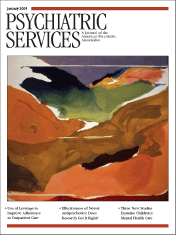Treatable Comorbid Conditions and Use of VA Health Care Services Among Patients With Dementia
Abstract
OBJECTIVE: Although dementia is a progressive degenerative disease, treatable comorbid symptoms, such as pain, aggression, depression, and psychosis, occur among more than 60 percent of patients with dementia. Compared with age-matched controls, patients with dementia use 70 percent more health services and account for 50 percent more managed care costs. This prospective study examined the longitudinal relationship between use of health care services and treatable comorbid conditions among patients with dementia. METHODS: Ninety-nine patient-caregiver dyads from the Michael E. DeBakey Veterans Affairs (VA) Medical Center in Houston, Texas, completed a one-time interview. Patients' VA records were reviewed one year later to examine the relationships between the study variables and three types of service use: inpatient medical stays, outpatient medical visits, and outpatient psychiatric visits. RESULTS: Pain was positively associated with all types of service use. Depression was associated with outpatient psychiatric visits. Psychosis and aggression were not significantly associated with future use of health care services. CONCLUSIONS: The results of this study confirm previous findings that pain and depression are associated with increased use of health care services. Although the other treatable comorbid symptoms, with the exception of pain, are associated with increased service use, their impact varies depending on the type of services provided. Interventions to improve the assessment and treatment of comorbid symptoms, especially pain, among patients with dementia may reduce service needs and thus reduce medical care costs.



